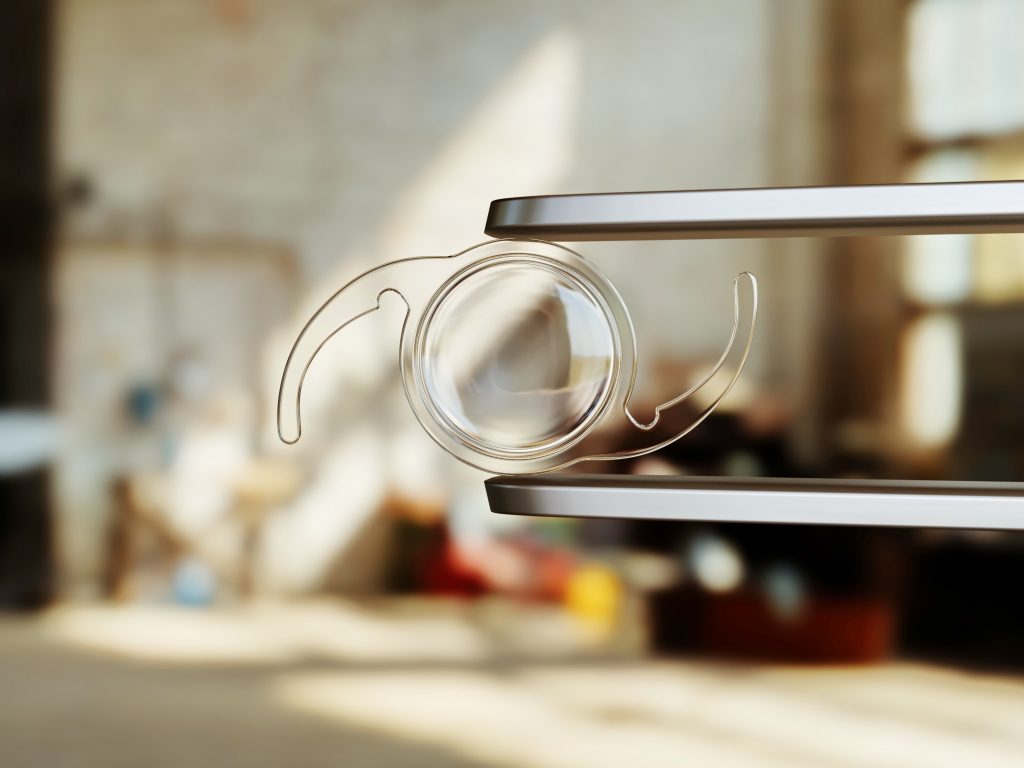Implantable Collamer Lens (ICL) Procedure at Birmingham, AL’s Leading Eye Surgery Center


If you’ve heard you’re not a candidate for vision correction procedures like LASIK or SMILE due to high myopia (nearsightedness), thin corneas, or astigmatism, Young H. Choi, M.D. Eye Surgery Center in Vestavia Hills, AL, has an alternative treatment for you.
Implantable Collamer Lens (ICL) Surgery is an advanced vision correction solution for patients with blurry vision caused by refractive errors. The artificial lens implant is set behind a patient’s iris and in front of his/her eye’s natural lens. The EVO ICL is the newest cutting-edge technology in phakic intraocular lenses, designed to correct a wide range of nearsightedness in patients. Dr. Choi remains at the forefront of the latest surgical advancements and innovative technologies to deliver the highest standard of ocular care.
ICL for Clear Vision: A Closer Look at How It Works
ICL is a permanent lens implant positioned behind a patient’s iris and in front of his/her eye’s natural lens to correct how light refracts on the retina, producing improved vision. Approved by the FDA in 2005, the Visian ICL served as the prior model of today’s EVO ICL. Compared to other vision correction procedures like SMILE or LASIK, ICL surgery doesn’t reshape or remove corneal tissue, so the procedure doesn’t weaken the ocular structure.
Key points about ICL:
- There’s less risk for dry eye
- The procedure doesn’t compromise the structure of the eye, so it is reversible and adjustable, unlike LASIK surgery
- Corrects moderate to severe nearsightedness
- It doesn’t reshape or remove corneal tissue, so it’s ideal for patients with thin or irregular corneas
- The lens implants last long-term, so there’s no maintenance required


Who is a Good Candidate for the EVO ICL Procedure?
An ideal candidate for ICL surgery depends mainly on the patient’s vision needs and specific circumstances that influence the need for the procedure.
Prospects for Lens Implants
- Between the ages of 21 and 45, who are not yet candidates for refractive lens exchange (RLE)
- High myopia
- Thin or irregular corneas
- Dry eyes
- Relatively healthy eyes with no history of eye disease and a stable prescription
Vision problems from myopia trigger the eyes to strain, causing tension and migraine-like symptoms. Here are Five Signs Your Vision is Causing Headaches.
When LASIK or SMILE Isn’t an Option
Many patients don’t meet the criteria for laser-assisted surgery, but that doesn’t mean there are no other options for good candidates seeking vision correction. Some patients hear that they are not a candidate for laser vision correction surgery due to severe nearsightedness, irregularly shaped or thinning corneas, or keratoconus (an eye condition where the cornea becomes thinner and forms into a cone shape).
For further information, check out Who Can and Cannot Get LASIK Eye Surgery featured on our blog.
Benefits of ICL Surgery
The refractive procedure offers many benefits beyond improved quality of sight and visual freedom without glasses or contact lenses, to highlight a few:
- Able to correct/reduce extreme nearsightedness that other procedures cannot treat
- May be surgically removed if needed
- Recovery is minimal; most patients return to normal activities within a few days
- The lens doesn’t touch any internal parts of the eye, so there’s less chance for complications
- The implantable Collamer Lens contains an ultraviolet filter for added protection
- Extended depth perception and improvement in night vision
The manufacturer of the EVO lens, STAAR Surgical, announced in 2022 that doctors had implanted over one million EVO lenses outside of the United States, with 99.4% of patients stating they would undergo the procedure again (STAAR Surgical Company, 2022).

Step-by-Step: How The EVO ICL Procedure Works
The cutting-edge technology used to create the EVO ICL procedure is a modified form of the proven lens technology used for cataract surgery. Like cataract surgery, the operation is keyhole surgery, which creates tiny incisions for improved visual outcomes. The procedure takes around 20-30 minutes per eye. Here’s what to expect:
-
Eye mapping & preparation
Dr. Choi will perform an extensive eye exam to create a personalized treatment plan before your operation. He will also take measurements to create a lens ideal for your eye’s anatomy and specific treatment needs.
-
Lens implantation
Dr. Choi will apply drops to numb your eyes and the surrounding area, then hold them open during the procedure with a special tool. During the procedure, Dr. Choi will create a tiny incision to place the lens through.
-
Recovery
You will be monitored for a few hours following the surgery to ensure the lenses are in the correct position.
Dr. Choi completed a focused fellowship in refractive surgery to gain specialty training in treating the refractive errors that are common in most patients. Despite their prevalence, refractive errors correlate with many conditions requiring varying avenues of care. With decades of refractive surgery experience, his expertise ensures a clear path to restored vision.
Eye Care and Recovery
After the procedure, you must arrange for someone to drive you home. Implantable Collamer Lens recovery comes with minimal discomfort and a rapid healing process. However, it’s essential to take it slow for the rest of the day and allow yourself to rest.
What To Expect After ICL Surgery
You will experience some of the following after EVO ICL surgery:
- Mild, temporary discomfort
- Halos (blurry rings of light)
- Light sensitivity
- Blurry vision
Aftercare
The aftercare instructions are minimal, and you will get more details on them during your visit:
- Take your antibiotic and moisturizing eye drop medications as prescribed by Dr. Choi.
- Avoid touching the eye area or engaging in physical activities for a few days following the surgery.
- You can return to work within a few days to a week.
- Our team will schedule follow-up appointments to monitor your healing and track your progress.
Lasting Results
ICL surgery is reversible, but it’s intended to be a permanent, lasting solution.
- Vision stability
- Stable prescription without the need for glasses or contact lenses
- With their biocompatible advanced lens material, the lenses can last a lifetime
- Eyesight can naturally change, so it accommodates the potential need for lens adjustment or replacement
ICL Surgery vs. LASIK: Which Is Right for You?
ICL and LASIK surgery provide excellent visual outcomes, but key distinctions could make one more suitable than the other. ICL is minimally invasive and does not affect the eye’s internal structure, whereas LASIK repositions the corneal flap using laser-assisted treatment.
| Feature | LASIK | ICL Surgery |
| Permanent? | Yes (corneal reshaping) | Reversible (lens implant) |
| High prescription strength? | Limited, -11 max | Up to -20 D |
| Safe for thin corneas? | No | Yes |
| Dry eye risk? | Moderate | Minimal |
| Recovery time | 1–2 days | A few days to a week |

See Life Clearly with Dr. Young H. Choi
Dr. Choi is a board-certified ophthalmologist by the American Board of Ophthalmology and is the owner and medical director of Young H. Choi M.D. Eye Surgery Center. For over 15 years, he has served the Birmingham community and has been recognized nationally for his expert care.
In addition to his expertise in refractive surgeries like ICL, LASIK, and SMILE, Dr. Choi has many specialties, including refractive lens exchange; cataract surgery, selective laser trabeculoplasty (SLT), and minimally invasive glaucoma surgery (MIGS).
His continued studies in refractive lens technologies and commitment to setting the standard in ocular care qualify him to deliver outstanding results for every kind of patient. If your vision isn’t as sharp as it used to be, visit Dr. Choi for a personalized experience that meets all of your eyes’ needs.
Implantable Contact Lens: Birmingham, AL, a Premier Destination for Ophthalmological Care
Young H. Choi, M.D. Eye Surgery Center is Birmingham, Alabama’s premier destination for corrective eye surgeries. We deliver compassion and the highest standard of care through advanced solutions and cutting-edge technology.
Ready to see life clearly without reading glasses? Request a consultation online or call us today to learn more about our specialized eye care services in Vestavia Hills and the Greater Birmingham area.

